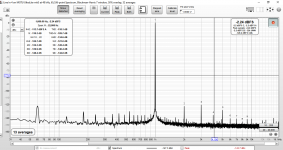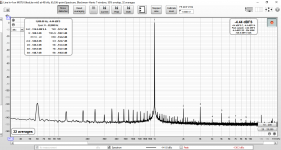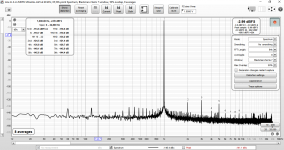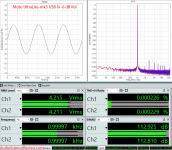D
Deleted member 148505
Yes it is still PFFB, jumpers are beside the input coupling caps. Bi-polar supply on the opamp is still being used, hence the large SMT component count for the switching and post regulators which occupy more than half of the front end section (leftmost part on the preview pic) and is responsible for higher BOM cost.Would the new Sylph-D200 configurable with PFFB implemented? and still equipped with bi-polar supply on the OPAMP?
D
Deleted member 148505
Sylph-D400 partially assembled kit will be available next week 🙂Sylph-D400 Mono TPA3255 will be back in stock soon as a DIY Kit:
ETA September 2022
https://www.jlelectronicsph.com/product/partial-kit-2pcs-sylph-d400m-tpa3255-pbtl-mono-400w-2
Quite embarrassed to even ask this but just confirming how to set up the solder bridge on the D200 under the board for balanced inputs - do I remove the bridge altogether or put another bridge to BAL ? 😬🤦♂️
Last edited:
D
Deleted member 148505
Got my Motu UltraLite MK5! =), even with JLE Interface (INA1651+LME49720) on the loopback chain, it can push up to -110dB THD+N with 7.5Vrms out. (the MK5 had replaced my Loxjie D30 + cosmos ADC setup).Hi, Yes voltage to be reduced is 12V DC.
30mA current is too high for LED, in practice, I use high values to prolong the life of the LED, and to reduce the brightness.
I already sold my Loxjie D30 V2 so I can't post a picture of a complete setup.
Here's a crude connection setup if you have an ADC module.
You can adjust the Vrms output limiter (by relay turn-off) going to the ADC by adjusting the potentiometer beside the LEDs.
So if you have an ADC that can accept a maximum of 2Vrms input, you need to set the limiter output to 2Vrms to avoid overloading the ADC.
The alligator clips should be connected to the out (speaker) of device under test.
JLE Interface can only measure power amplifiers with 100dB or lower SINAD, best partner is with MOTU M4 for a cheap setup since they have similar performance.
Regards,
Lester
Quite more expensive but it makes a simpler and easier setup than using a separate signal generator + ADC.
The ultralite MK5 uses a switching power supply, I'll try to connect it to a power bank to reduce the mains pickup.
Attachments
Last edited by a moderator:
D
Deleted member 148505
Moving all the measurement equipment away from the mains socket reduced the 60hz pickup while still using the included 15V wall wart supply from the Motu UL MK5. Will try 4*18650 series on the MK5 next time.
I lowered the resistance value of the voltage dividing input resistors feeding the INA1651 which drastically reduced the THD (at the expense of lower input impedance and resistor divider dissipation, thus only up to 60Vrms can be measured) The resulting loopback performance is just 3dB shy of the DAC performance of Motu UL MK5 measured by ASR (attached 2nd pic). Doing some revisions on my JLE interface, will try to add relay on the input to limit the current if an accidental large voltage was entered on DIV1 setting, will check if the TPD2E007 can handle the initial peak dissipation.
I lowered the resistance value of the voltage dividing input resistors feeding the INA1651 which drastically reduced the THD (at the expense of lower input impedance and resistor divider dissipation, thus only up to 60Vrms can be measured) The resulting loopback performance is just 3dB shy of the DAC performance of Motu UL MK5 measured by ASR (attached 2nd pic). Doing some revisions on my JLE interface, will try to add relay on the input to limit the current if an accidental large voltage was entered on DIV1 setting, will check if the TPD2E007 can handle the initial peak dissipation.
Attachments
D
Deleted member 148505
Next version of Sylph-D100 will have a -100dB THD+N performance into 5W 4ohm (using opa1656 in a socketable opamp buffer section). Gain is 14dB so it needs a preamp or a 4Vrms output balanced DAC to reach the clipping power.
Maybe the cheapest way to get an amplifier that crosses 100dB SINAD at 5W 4ohm! Sound is also optimized so it's not just about SINAD.
We'll be opening a pre-order sale some time in April, stock is only around 30pcs (next stock of TPA3251 at Mouser is around June)
With OPA1656, price will be slightly higher, than without opamp.
https://www.sylphaudio.com/product/sylph-d100-tpa3251-stereo-amplifier-module-ready-to-run
Kindly message us at support@sylphaudio.com if you are interested so that we can put you in a queue.
Pic of version 1 (version 2 is almost the same except that PFFB jumpers were removed on the top side, input pin assignment was changed to match xlr numbering)

Maybe the cheapest way to get an amplifier that crosses 100dB SINAD at 5W 4ohm! Sound is also optimized so it's not just about SINAD.
We'll be opening a pre-order sale some time in April, stock is only around 30pcs (next stock of TPA3251 at Mouser is around June)
With OPA1656, price will be slightly higher, than without opamp.
https://www.sylphaudio.com/product/sylph-d100-tpa3251-stereo-amplifier-module-ready-to-run
Kindly message us at support@sylphaudio.com if you are interested so that we can put you in a queue.
Pic of version 1 (version 2 is almost the same except that PFFB jumpers were removed on the top side, input pin assignment was changed to match xlr numbering)
Last edited by a moderator:
D
Deleted member 148505
Sylph-D100 (version P02) Initial power test looks good, it can get unclipped 18Vrms at 4 ohms from 20Hz to 20kHz and is highly stable.
Right channel THD+N 5W at 4Ω using NE5332 opamp and LRS-350-36 adjusted to 37.8V DC.
Result:
-108.1dB THD
-99.6dB THD+N
The noise (+N) part will be better if OPA1656 is used, so it will reach around -100dB or better when measured by an AP system and a good load resistor.
To make the opamp socketable, we had to balance engineering trade-offs between low THD+N and using larger resistor values. We chose larger resistor values as the opamp buffer layout uses only a 2-layer board, and sockets for the opamp, the THD will be good but the noise will be higher.
Using low-value resistors (like 1K ohms for feedback) can lower the noise floor, but if the layout is only a 2 layer board, or if the opamp is socketable, it will introduce errors due to any stray capacitance/inductance on the layout or socket which will increase the distortion (THD part).
THD+N measurements can also be affected by low-quality resistive dummy loads or if loads lower than 4 ohms is used, such as 3.5 to 3.8 ohms.
I will perform THD+N measurements next time with a low quality - resistor dummy load (to check for the worst case) and with OPA1656.


Right channel THD+N 5W at 4Ω using NE5332 opamp and LRS-350-36 adjusted to 37.8V DC.
Result:
-108.1dB THD
-99.6dB THD+N
The noise (+N) part will be better if OPA1656 is used, so it will reach around -100dB or better when measured by an AP system and a good load resistor.
To make the opamp socketable, we had to balance engineering trade-offs between low THD+N and using larger resistor values. We chose larger resistor values as the opamp buffer layout uses only a 2-layer board, and sockets for the opamp, the THD will be good but the noise will be higher.
Using low-value resistors (like 1K ohms for feedback) can lower the noise floor, but if the layout is only a 2 layer board, or if the opamp is socketable, it will introduce errors due to any stray capacitance/inductance on the layout or socket which will increase the distortion (THD part).
THD+N measurements can also be affected by low-quality resistive dummy loads or if loads lower than 4 ohms is used, such as 3.5 to 3.8 ohms.
I will perform THD+N measurements next time with a low quality - resistor dummy load (to check for the worst case) and with OPA1656.
Last edited by a moderator:
D
Deleted member 148505
Regarding the sound of the latest Sylph-D100 with OPA1656, it has softer highs and better details than my KGUSS MA12070, and fuller midrange sound than my Topping PA5 as well as better sparkling highs. Also, it can get 100W at 4ohms if driven by 38VDC supply. I really think it can compete with the best amps out there.
I've opened the sale for the first 5pcs here which can be shipped by early next week, we will ramp up the production once we got all the parts required (ETA 1 month):
https://www.sylphaudio.com/product/sylph-d100-tpa3251-stereo-amplifier-module-ready-to-run
I've opened the sale for the first 5pcs here which can be shipped by early next week, we will ramp up the production once we got all the parts required (ETA 1 month):
https://www.sylphaudio.com/product/sylph-d100-tpa3251-stereo-amplifier-module-ready-to-run
D
Deleted member 148505
We actually have opened the slot for 16 units which were already sold out, it will be shipped by batch on March 31, April 3, and April 7.I've opened the sale for the first 5pcs here which can be shipped by early next week, we will ramp up the production once we got all the parts required (ETA 1 month):
Next pre-order sale would be on April 24 (ship out date after 1 to 2 weeks).
D
Deleted member 148505
Here is the measurements of a random stock of Sylph-D100 with OPA1656 buffer
Performance reaches 102dB SINAD at 5W 4 ohms if OPA1656 is being used.
Test setup:
Power Supply: LRS-350-36 adjusted to 38V
DAC: SMSL DO100
ADC: MOTU UL MK5
Custom buffer/interface to protect the ADC
First measurements with a standard 1KW dummy load (large green type)
Left Channel 5W 4ohm

Right Channel 5W 4ohm

1dB to 2dB performance is being lost when a 100W not-so-good dummy load is being used
Left Channel 5W 4 ohms

Right Channel 5W 4 ohms

The sagami variant inductor actually adds some 2nd harmonic distortion, if a flat wire type inductor is being used, the THD+N performance will improve to -103dB to -105dB, but the second harmonic distortion will be buried in the noise floor, and the FFT will become 3rd harmonic dominant. Using flat wire inductor in BTL TPA3251 tends to lower down the 2nd harmonic, hence I sticked to the non-flat wire sagami-like inductor.
THD+N with distortion high pass set at 400Hz in REW. (Noise floor is higher from 400Hz down to 20Hz)
Right Channel 5W 4 ohm

Performance reaches 102dB SINAD at 5W 4 ohms if OPA1656 is being used.
Test setup:
Power Supply: LRS-350-36 adjusted to 38V
DAC: SMSL DO100
ADC: MOTU UL MK5
Custom buffer/interface to protect the ADC
First measurements with a standard 1KW dummy load (large green type)
Left Channel 5W 4ohm
Right Channel 5W 4ohm
1dB to 2dB performance is being lost when a 100W not-so-good dummy load is being used
Left Channel 5W 4 ohms
Right Channel 5W 4 ohms
The sagami variant inductor actually adds some 2nd harmonic distortion, if a flat wire type inductor is being used, the THD+N performance will improve to -103dB to -105dB, but the second harmonic distortion will be buried in the noise floor, and the FFT will become 3rd harmonic dominant. Using flat wire inductor in BTL TPA3251 tends to lower down the 2nd harmonic, hence I sticked to the non-flat wire sagami-like inductor.
THD+N with distortion high pass set at 400Hz in REW. (Noise floor is higher from 400Hz down to 20Hz)
Right Channel 5W 4 ohm
Last edited by a moderator:
D
Deleted member 148505
Non-working holiday here in April 6 and 7, so all units will be shipped out before April 5.We actually have opened the slot for 16 units which were already sold out, it will be shipped by batch on March 31, April 3, and April 7.
Next pre-order sale would be on April 24 (ship out date after 1 to 2 weeks).
Some parts will be delayed, so the next pre-order sale will be moved to 1st week of May.
Last edited by a moderator:
D
Deleted member 148505
Just saw Topping PA7 8R5W FFT.
Here's the preview of 8ohm 5W FFT of my unoptimized PBTL prototype running on Mean Well SE-450-48@51V, the distortion is quite similar to PA7.
Can't compete on the noise though since the prototype only uses OPA1656 in a socket with a high-ish gain.
THD is -108dB or 0.00039%


Here's the preview of 8ohm 5W FFT of my unoptimized PBTL prototype running on Mean Well SE-450-48@51V, the distortion is quite similar to PA7.
Can't compete on the noise though since the prototype only uses OPA1656 in a socket with a high-ish gain.
THD is -108dB or 0.00039%
Last edited by a moderator:
D
Deleted member 148505
With some gain adjustments, although the final module is several months away.
8 ohm 5W using Mean Well SE-450-48 @51V DC.

8 ohm 5W using Mean Well SE-450-48 @51V DC.
Last edited by a moderator:
D
Deleted member 148505
The low gain, low THD+N version will be available around June 2023. It will get -103dB to -104dB THD+N at 5W 4 ohmalthough the final module is several months away
Specs here (will update the actual pic once available): https://www.sylphaudio.com/product/2pcs-sylph-d400-gen5-tpa3255-pbtl-mono-low-gain
Medium gain (previous version) will still be available (around July 2023) since it can get higher power than the low gain version. https://www.sylphaudio.com/product/partial-kit-2pcs-sylph-d400m-tpa3255-pbtl-mono-400w-2
D
Deleted member 148505
Posting the look of the next gen D400M.
Decided to set the gain at a very low level (10dB voltage gain), the THD+N I think will exceed -105dB at 5W 4ohms. (minimum performance among module to module variation is -105dB at 5W 4ohms) -107dB at 5W 4R is possible.
Power before clipping (51V, 1KHz): 88W into 8 ohms, 175W into 4 ohms. 280W into 2 ohms load.

Decided to set the gain at a very low level (10dB voltage gain), the THD+N I think will exceed -105dB at 5W 4ohms. (minimum performance among module to module variation is -105dB at 5W 4ohms) -107dB at 5W 4R is possible.
Power before clipping (51V, 1KHz): 88W into 8 ohms, 175W into 4 ohms. 280W into 2 ohms load.
Will get delayed so around 4th week of June.The low gain, low THD+N version will be available around June 2023.
Last edited by a moderator:
D
Deleted member 148505
Sylph-D100 is now available in small batches.
Gain was slightly reduced from 5x to 4.1x (needs 5Vrms BAL / 2.5Vrms SE to reach full power)
https://www.sylphaudio.com/product/sylph-d100-tpa3251-stereo-amplifier-module-ready-to-run
Gain was slightly reduced from 5x to 4.1x (needs 5Vrms BAL / 2.5Vrms SE to reach full power)
https://www.sylphaudio.com/product/sylph-d100-tpa3251-stereo-amplifier-module-ready-to-run
Honest question - which of your clients would prefer low gain vs medium or high gain? Unless they are feeding from pro-level sources they are going to have use a pre-amp to bump the power up.
It feels like the chase for ever-lower THD+N and SINAD is hurting the real-world applicability of this stuff. What you've already achieved is already past the limits of human hearing anyway, in almost all use cases.
It feels like the chase for ever-lower THD+N and SINAD is hurting the real-world applicability of this stuff. What you've already achieved is already past the limits of human hearing anyway, in almost all use cases.
Last edited:
D
Deleted member 148505
Presently the replaceable opamp socket is the bottleneck in the module design, we can't increase the buffer stage to more than 3x without hurting the performance, and the sound. We will accompany a separate gain stage board in the future. (If we change the socket DIP 8 to SOIC 8 then we can use gain stage + buffer stage in a single module (4 opamps total), but we opted for a 2pcs socketable opamps instead)Honest question - which of your clients would prefer low gain vs medium or high gain? Unless they are feeding from pro-level sources they are going to have use a pre-amp to bump the power up.
It feels like the chase for ever-lower THD+N and SINAD is hurting the real-world applicability of this stuff. What you've already achieved is already past the limits of human hearing anyway, in almost all use cases.
With the present 4.1x gain of Sylph-D100, some DACs with 5Vrms output can drive it to clipping. And the performance can easily reach -103dB THD+N at 5W 4 ohms even when using the included JRC opamp.
Last edited by a moderator:
- Status
- Not open for further replies.
- Home
- Vendor's Bazaar
- Amplifier Modules and PCBs For Sale



